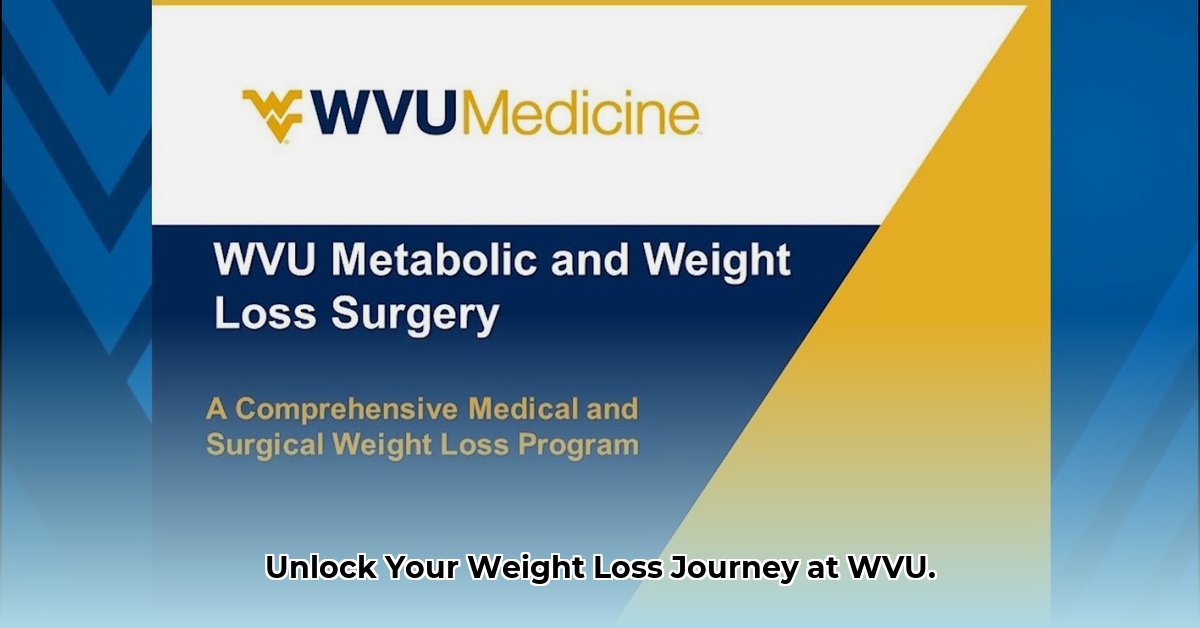
Ready to embark on your weight loss journey? West Virginia University Medicine (WVU Medicine) offers two distinct programs designed to help you achieve your health goals: the Medical Weight Management Clinic and the Eat Well, Live Well program. This guide will help you understand the differences between these programs, enabling you to choose the option that best suits your individual needs and preferences.
Understanding Your Options: WVU Medicine's Weight Loss Programs
WVU Medicine provides two tailored approaches to weight management. Both aim for long-term lifestyle changes but differ significantly in intensity and structure. Let's explore each program in detail.
WVU Medicine's Medical Weight Management Clinic
This clinic provides comprehensive, medically supervised weight loss. It's ideal for individuals with a BMI of 32 or higher, or those with weight-related health concerns like diabetes or high blood pressure. This program offers personalized care and intensive support.
- What it offers: Personalized care plans, regular medical monitoring by physicians, nutritional counseling from registered dietitians, behavioral therapy to address emotional eating or stress, and potentially medication management.
- Intensity: High; requires commitment to regular appointments and follow-ups.
- Cost: Generally higher due to the extensive services provided. Inquire about payment plans and financial assistance options.
WVU Medicine's Eat Well, Live Well Program
This program focuses on community-based support and group learning. It's a great option if you're seeking a more accessible, less intensive approach to improving your overall lifestyle. This program fosters a supportive community environment.
- What it offers: Group sessions led by health professionals, nutritional education, guidance on incorporating more physical activity into your routine, and access to online resources through MyChart.
- Intensity: Moderate; less demanding than the Medical Weight Management Clinic.
- Cost: Generally more affordable than the Medical Weight Management Clinic.
How to Choose Between WVU Medicine's Weight Loss Programs: A Side-by-Side Comparison
This table highlights the key differences to aid your decision-making process:
| Feature | Medical Weight Management Clinic | Eat Well, Live Well Program |
|---|---|---|
| BMI Requirement | ≥ 32 kg/m² (or presence of weight-related health conditions) | No specific BMI requirement |
| Intensity | High (Frequent appointments, individualized plans) | Moderate (Group sessions, self-paced progress) |
| Approach | Personalized, medically supervised | Group-based, community support |
| Services | Comprehensive medical evaluation, personalized plans, regular monitoring, behavioral health support | Group sessions, nutritional education, physical activity guidance, online resources via MyChart |
| Cost | Higher (due to intensive, personalized care) | Lower (due to group setting and less intensive supervision) |
| Technology Integration | May incorporate additional digital tools beyond MyChart | Utilizes MyChart for convenient access and communication |
Navigating Your Decision: Key Questions to Consider
To choose the program that best fits your individual circumstances, ask yourself:
What's my BMI? A higher BMI (≥32) generally suggests the Medical Weight Management Clinic. However, even with a lower BMI, if you have weight-related health concerns, this program may be a better fit.
Do I have weight-related health problems (e.g., diabetes, high blood pressure)? The Medical Weight Management Clinic offers more comprehensive support for managing these conditions alongside weight loss.
Do I prefer individual or group settings? Your personality and learning style will influence your preference for intensive individual support or the collaborative environment of group sessions.
What's my budget? Consider the cost differences and explore potential payment plans or financial assistance programs.
Success Strategies for Lasting Weight Management
Regardless of the program you choose, these strategies will significantly increase your chances of long-term success:
Set Realistic Goals: Small, incremental changes are more sustainable than drastic measures. Aim for gradual progress rather than rapid weight loss.
Build Your Support System: Lean on friends, family, your support groups within the program, or a therapist for motivation and encouragement during challenging times.
Track Your Progress: Monitoring your food intake, activity levels, and weight helps you stay accountable and celebrate milestones. This can be done through journaling, apps, or other methods.
Practice Self-Compassion: Weight loss is a journey, not a race. Be patient, understanding, and kind to yourself throughout the process. Setbacks are normal; focus on learning from them and moving forward.
Addressing Potential Challenges
Weight loss is not always easy. Here are some common challenges and how to address them:
High initial cost (Medical Weight Management Clinic): Explore payment plans and inquire about financial assistance options offered by WVU Medicine.
Potential program dropouts (both programs): Actively engage with the support systems built into each program. Connect with fellow participants, utilize online resources, and schedule regular check-ins with your healthcare provider or program coordinator.
Limited individual attention (Eat Well, Live Well): Supplement group sessions with additional resources like online support groups, nutrition apps, certified personal trainers for your fitness goals, or nutritionists.
Your Next Step: A Healthier You Awaits
Choosing the right program is a significant step toward a healthier lifestyle. Contact WVU Medicine today to learn more about both programs and schedule a consultation. Remember, taking the first step is the most important.
Disclaimer: This information is for general knowledge and does not constitute medical advice. Always consult with a healthcare professional before starting any weight loss program.